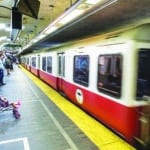


Signals, Big Bus Lanes Headline T’s 5-Year Investment Plan
MBTA overseers on Tuesday unanimously approved the latest five-year plan to invest in systemwide improvements, embracing a $9.8 billion roadmap that one watchdog group called a “nuts and bolts” approach.

Outside MBTA Zone, Transit Services Seen as ‘Lifelines’
Beacon Hill is immersed in debate over how many more millions of dollars to devote to the MBTA, but transit services outside of the T region are absorbed in their own challenges they must face with even less funding.

Senate, House Headed for $420M MBTA Funding Showdown
Senate Democrats want to send only $370 million to the MBTA under a new spending plan fueled by excess surtax revenues, much less than the House approved across workforce, infrastructure and reduced fare investments at the beleaguered transit agency.
CRE Must Claim Its Seat at the Table Writing MBTA’s 2050 Plans
The MBTA is writing its next long-range plan right now, but investments like new train lines and BRT networks that can unlock development won’t happen without industry input.

MBTA Envisions Another Burst of Hiring to Boost Repairs, Frequency
The hiring blitz at the T will keep going full steam ahead. Or it probably will, at least if the MBTA’s final budget looks like the preliminary version that’s up for a vote Thursday.

House Tees Up Vote on Healey’s Big MBTA Investments
House Democrats will seek a vote this week on a roughly $1.3 billion spending plan that would inject hundreds of millions of dollars into the MBTA as the agency wrestles with a major budget gap.

Western Mass. Legislators Call Healey’s MBTA Plan Unfair
The administration says the MBTA needs the $870 million to stay afloat and preserve progress made in the last two years, but “this didn’t look like equity or anything close,” two legislators say.

Fed Funds ‘Have Continued to Come in,’ T Chief Says
The MBTA has not had any federal grants rejected or revoked amid a major belt-tightening campaign by the Trump administration, according to the T’s top boss, who also warned that tariffs could impact costs for materials purchased by transit agencies around the country.

Will Tariffs Hurt MBTA’s Recovery?
With the subway cars on its biggest line so old that it’s having to run shorter trains to prevent putting broken trains on the tracks, the fate of CRRC-made trains is a vital concern.

T Boss Says Fare Gates Coming This Year to Two Train Hubs
The MBTA expects fare gates to be operational at two more Boston commuter rail hubs later this year, the T’s general manager said after a state watchdog criticized the agency’s approach to fare collection.

Woburn Transit Hub Offered for Development, with Housing Limits
State real estate officials are seeking developers’ pitches for a transit-oriented project at the MBTA’s Anderson station in Woburn.

The Biggest Call the T Will Make in the Next Five Years
A big challenge looms for the MBTA as it tries to move its commuter rail lines into the 21st century: Picking who will operate the sprawling system for the public transit agency, how will they do it, and for how long.
The Perfect Time for a Smart, State-Focused Transportation Plan
Regardless of what happens in Washington, one thing is certain: Massachusetts must take action to take control of our transportation future.

Somerville Green Line Crash Sends Five to Hospital
The T says it’s in the process of installing technology that’s designed to detect when trains are too close to each other, or are going too fast, after over 15 years of false starts.

Report Argues More Density Needed Across MBTA Network
Despite having one of North America’s most extensive commuter rail and subway networks, Greater Boston has some of the least-dense areas around transit stations, according to a new report.

T Wants Trains to Go Faster on Red, Orange Lines
With massive patches of slow zones now mostly repaired, MBTA officials have set their sights on pushing some subway speeds to higher levels as one of the next major goals as a way to improve capacity on the lines’ outer stretches.

Healey Plans to Stabilize T with Budget Plan
The MBTA drained its reserves to balance its fiscal year 2025 budget, and officials project the agency will face a roughly $700 million gap in the next fiscal year that begins July 1, thanks in part to underperforming sales tax revenue.

Healey’s Transportation Funding Task Force Misses Dec. 31 Deadline
The task force Gov. Maura Healey created to propose a new funding model for transportation in Massachusetts has missed its end-of-2024 deadline, and sources say the concepts currently being bandied about fall well short of what some had been hoping for.

Bus Lane Camera Enforcement Bill Sent to Healey
Motor vehicles that stop or park in bus-only lanes could face fines ranging from $25 to $125, while those parked at bus stops could be fined $100 under the bill.





